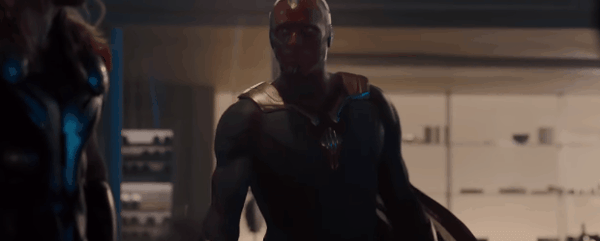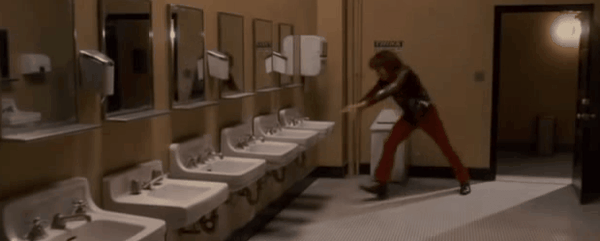 Have you felt this: you've just written a piece of original fiction you stare up at it on the page, curious if you've violated a critical rule of storytelling?
Have you felt this: you've just written a piece of original fiction you stare up at it on the page, curious if you've violated a critical rule of storytelling?
Maybe the premise sucks? Maybe it's a no-no to have somebody's motivation be item-X or person-Y?
Something that you can't help but be a pessimist about the way things are structured. But we here at Ghost Little are all about teaching this planet how to write better stories. That's why I assembled a list of 7 tropes to flat-out avoid if you're trying to put something to the page...
no. 1) Mind-control is always boring.
The character should be given his or her own motivation. The same goes for characters being possessed by ghosts or body-swapping. There's no tragic irony in a mind-controlled best friend giving bad advice to the protagonist, and the protagonist trusts them because they're BFF, and then they get into trouble, and they blame the best friend, but the best friend was all "I was under mind-control, bro."
Lose the trope and actually drive a real wedge between two characters. Make it a tragic misunderstanding and make sure you earn it. Place the characters at fault. Make it worse before it gets better. Much better than a villain slipping a vial of mind-controlling mandragora extract into the good-guy's oatmeal.
no. 2) Spontaneous visions are much too convenient a trope.
Dream sequences barely get a pass, but I avoid repetitious, portentous dreams. There's no worse plot device to get a character from A to B than a dream or God-sent vision. D'you think nobody will believe what they saw? Too bad, we've got to get to the new plot-point, and we need the odds stacked against the character, and maybe they'll grow and go a little crazy in the process, and then the villain can be there waiting for them at the new location and do the "I summoned you here, and you're becoming insane, like ME!" speech.
No spontaneous visions!

no. 3) No clones, ever.
"He's exactly the same in every way, and has all your memories and your gun-fu, skills!"
Nope. Not even if the clone is given an eye-patch and a goatee. But still this is another prime example of "Just Use A Sibling." Clones imply that a lot of people with lab coats and clipboards went into a work for years to grow some clone in a tank, and then raise the kid, and then give him or her the a history lesson on their clone-life, but then the clone is driven mad at age eighteen when they realize they're a clone, and then the go into a "seen-your-own-clone-coma."
Then it's a revenge cycle. Clones are always driven by an inferiority complex. It's not original fiction if there are clones pretending to be other characters. There are so many other ways to attack this conflict, pick one!
no. 4) Comas are a stupid trope.
"If only Daxton weren't in a coma! He could tell us the location of the amulet."
But, no, the writer needed to remove this character from the equation while the others fuss around in a holding pattern.
Instead, make the potential coma indisposed in some other way. Send them to Nepal or on a train-journey across India. At least then they might come back changed a little instead of the person waking up two years later when it's convenient.
"But I've missed so much during my... coma. Things have changed."
Lord, no.
no. 5) Nobody is allowed to shave their head or emotionally wreck a bathroom before the third act.

If there's anything better than a sink-ripping scene, it's a head-shaving sequence, preferably with a large knife and some hot lather while hunched over a filthy sink. Extra points if they break the mirror and rip the sink out of the wall in anger. It's okay to have the character lose it, but only if shit has really gotten bad.
Again, it's gotta be earned.
We're talking middle-of-nowhere and no hope left dire straits. If somebody shaves their head before that, they're just crying out for attention. It's okay if this CHARACTER is crying for attention, so if that happens, being a directionless malcontent better be part of who the character is. Otherwise, there's no need for them to be reaching for the straight razor.
no. 6) Amnesia remains the absolute worst trope in fiction.
Absolutely not.
Want to know what they can't remember? That they used to be evil. Or the location of the plot device. Or that he banged her in a broom closet the night before she was supposed to have a tennis court built in her back yard.
(See, you probably thought I was going to say "get married," didn't you?)
A tennis court is a lot of maintenance. Also, amnesia is stupid. Don't let being a blank slate be the ultimate, defining trait for a character. You can make them an audience cipher in less intrusive ways. The silent protagonist is the property of the video game industry, and unless you're Gordon Freeman or Crono, your silent protagonist sucks.
no. 7) If it was all a dream, make it feel like a dream.
If you've ever been a creative writing student, there's no doubt you've written yourself into a corner before where the only logical conclusion is that the protagonist either kills themselves, or wakes up in a fright to discover it was all a dream.
Some might tell you dreams are insincere and mean the story doesn't matter. While that's often true, a dream-state is a unique sandbox to jag around in. Cool dreams are cool. They can be inspiring and terrifying. The best way to utilize a dream is to make the dream state so viciously unpredictable that experiencing it is more remarkable than simply having an odd day in reality.
For instance, compare Christopher Nolan's Inception, a magical realism movie about dreams, to any movie by David Lynch, which operate on true dream logic. The frightening inexplicable nonsense of dreams is the resource you should flex, should you chose to involve dreams. In writing, dreams are an idea manifestation, not a reset button ![]() .
.
Did I miss anything?

